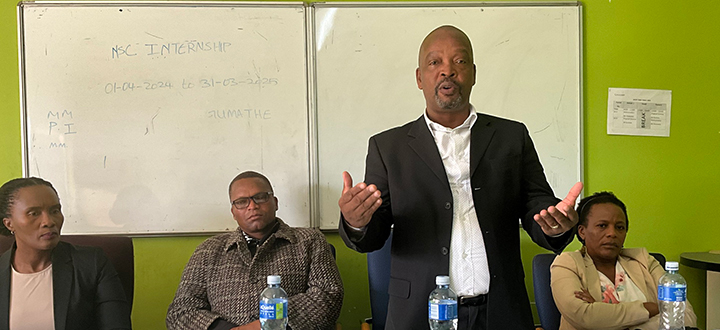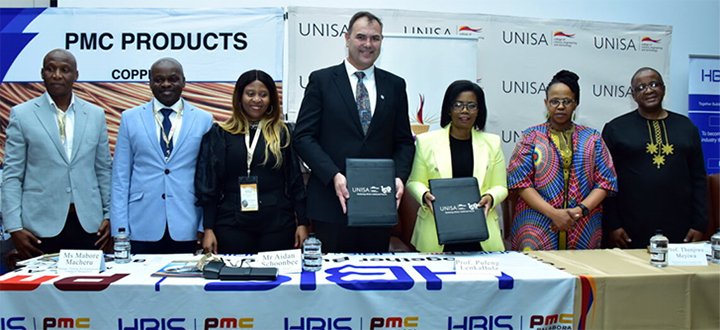College of Science, Engineering & Technology
Goal-driven engineer shakes up the industry

The goal-driven Dr Adolph Anga Muleja (Senior Lecturer, CSET) is very aware of the global challenges of energy and water. Muleja passed his master’s cum laude and these global challenges motivated him to register for a PhD in chemical engineering to pave the way for him to contribute to global socio-economic development.
Senior lecturer in Unisa’s College of Science, Engineering and Technology (CSET), Dr Adolph Anga Muleja believes that researchers should formulate practices that will solve the challenges of the most vulnerable members of society. Muleja, deployed at the Nanotechnology and Water Sustainability (NanoWS) research unit, is one of ten chosen South African researchers in the Talented Young Scientist Programme (TYSP) - a highly competitive bilateral exchange programme between China and SA.
He is a National Research Foundation (NRF) Y-rated researcher, a category designed for young researchers not over the age of 40, who have held a doctorate or equivalent qualification for less than five years at the time of application.
"The rating means that I am recognised by all reviewers as having the potential to establish myself as a researcher in the next five years from the end of the review cycle, based on the quality and impact of my research outputs. The rating will help with my core scientific goals and personal values in research, work ethic and professional achievements as my peers will evaluate my contribution every five years."
Muleja added that the rating process involves an intricate peer evaluation; therefore, the award is a testimony to his aptitude as a young researcher in the fields of engineering sciences, chemical sciences and chemical engineering. He is humbled to be acknowledged for such an achievement. "I know that much work is still to be accomplished in the short and long term. I am quite grateful to my PhD supervisors and postdoctoral mentor for their guidance during the past seven years."
The immediate benefit of the rating is an incentive funding for rated researchers (IFRR), which may be used for, among others, small equipment, technical or ad hoc assistants, materials and subsistence. The rating qualifies him to apply for further funding, including the Research Development Grants for Y-rated researchers and the Competitive Programme for rated researchers with the NRF. Muleja explained that if he is successful with any of these grants, most of his devised research projects would be fully funded and this would contribute immensely to his career growth toward an established researcher.
According to Muleja, the NRF rating equally benefits Unisa by contributing to the institution’s Strategic Plan (2016-2023) in research and innovation. While Unisa grows researchers, it also retains skills in the higher education sector to empower students with knowledge. Students are confident that they are taught by experienced academics who are recognised by their peers in their field of expertise.
Muleja is part of research collaborations with researchers from other institutions working in the domain of chemical photocatalytic membrane reactor, nanocomposite materials and heterogeneous catalysis from concept to pilot scale application. These include collaborations with the Cranfield Water Science Institute, UK, through the UK-South Africa University Partnership Grants at Unisa and Rutherford Fund Strategic Partner Grants at Cranfield.
In brief, his current research deals with chemical reaction engineering in water, energy and environmental sustainability. The investigation involves various aspects relating to his research interest areas, such as, but not limited to, waste valorisation in wastewater treatment (WWTP) and energy generation through XTL.
Muleja concluded by advising aspiring researchers in his field to start with the mastering of techniques and significant contribution to the scientific body of knowledge. They should expect to embrace a smart and hard-work attitude and a culture to ensure quantity and quality outputs to sustain their career path growth.
* By Nancy Legodi, Acting Journalist, Department of Institutional Advancement
Publish date: 2020-05-15 00:00:00.0

 Unisa remains anchored among the waves
Unisa remains anchored among the waves
 Inhlanyelo Hub explores sustainable tourism initiatives in Marico Biosphere Reserve
Inhlanyelo Hub explores sustainable tourism initiatives in Marico Biosphere Reserve
 Unisa KZN Region explores extending university services to KwaMpungose community
Unisa KZN Region explores extending university services to KwaMpungose community
 Unisa's catalytic niche areas provide industry-focused mining innovations
Unisa's catalytic niche areas provide industry-focused mining innovations